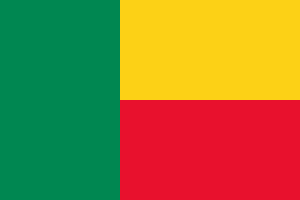Language/Fon/Vocabulary/Days-of-the-Week
Hi Fon learners! 😊
In this lesson, we will learn the days of the week in Fon, with some cultural information and interesting facts. Knowing the days of the week is crucial for effective communication, scheduling and planning your activities.
Like in many African cultures, Fon people attach great importance to the day of birth. Each day is associated with a particular deity or spirit, and it is believed that people born on a specific day receive the qualities and protection of the corresponding deity. For instance, someone born on Monday would be said to have received the blessings of the deity "Manigri" (the ancestor) and would have attributes such as wisdom, maturity, kindness, and success in business. This belief is still deeply rooted among many Fon people and has influenced their naming system, as they often include the day of birth in their names.
Once you've mastered this lesson, take a look at these related pages:Say Hello and Greetings in Fon, Express Surprise & Health.
Pronunciation Tips[edit | edit source]
Before we start, let's review some key pronunciation tips. The diacritical marks accent on some of the vowels are essential to distinguish similar words. Here are some examples: - é (acute accent) is a high-pitched sound and pronounced like the "e" in "hey." - è (grave accent) has a low-pitched sound and pronounced like the "e" in "pet." - ê (circumflex accent) sounds like the "e" in "there." - ɔ́ (acute accent on the "ɔ") is a high-pitched sound and pronounced like the "o" in "go." - ɔ̀ (grave accent on the "ɔ") has a low-pitched sound and pronounced like the "o" in "pot."
Days of the Week in Fon[edit | edit source]
Now that we have reviewed some pronunciation tips, let's learn the days of the week in Fon.
| Fon | Pronunciation | English |
|---|---|---|
| Ason ~di~ (Asondi) | a-sɔ̃-di | Monday |
| Atalaku ~di~ (Atalakudi) | a-ta-la-kɔ̃-di | Tuesday |
| Akouété ~di~ (Akouétédì) | a-ku-e-te-di | Wednesday |
| Alɔwɛtɔ ~di~ (Alɔwɛtɔdi) | a-lɔ-wɛ-tɔ-di | Thursday |
| Afiyɛkù ~di~ (Afiyɛkudì) | a-fi-je-ku-di | Friday |
| Asɔtɔnù ~di~ (Asɔtɔnudì) | a-sɔ-to-nu-di | Saturday |
| Asabikú ~di~ (Asabikudì) | a-sa-bi-ku-di | Sunday |
In Fon, the word "di" means "day." Notice how the names of the days are formed by combining the name of the spirit or deity with the word for "day." Each name has a specific meaning related to the attribute, function or symbol of the spirit that represents it. For instance, Asondi means "the day of Manigri," the spirit of the ancestors, who is believed to guide and protect people and offer them wisdom, inspiration and prosperity. Atalakudi means "the day of Atalaku," the spirit of the market and trading, who is associated with wealth, commerce, negotiation and arts. Akouétédì means "the day of Akouété," the spirit of agriculture and farming, who is linked with the earth, fertility, food, medicine and spirituality. Alɔwɛtɔdi means "the day of Alɔwɛtɔ," the spirit of justice and power, who is revered as the guardian of the moral order, social harmony, leadership and decision-making. Afiyɛkudì means "the day of Afiyɛkù," the spirit of love and beauty, who represents the feminine energy, creativity, music, dance and romance. Asɔtɔnudì means "the day of Asɔtɔnu," the spirit of war and bravery, who embodies the qualities of courage, resilience, discipline and strategy. Asabikudì means "the day of Asabiku," the spirit of divination and spirituality, who is known for the power of prophecy, revelation, wisdom and healing.
Let's practice the pronunciation of the days with this dialogue:
- Person 1: Asondi. (Monday)
- Person 2: Asondi, the day of the ancestors.
- Person 1: Atalakudi. (Tuesday)
- Person 2: Atalakudi, the day of the market.
- Person 1: Akouétédì. (Wednesday)
- Person 2: Akouétédì, the day of farming.
- Person 1: Alɔwɛtɔdi. (Thursday)
- Person 2: Alɔwɛtɔdi, the day of justice.
- Person 1: Afiyɛkudì. (Friday)
- Person 2: Afiyɛkudì, the day of love.
- Person 1: Asɔtɔnudì. (Saturday)
- Person 2: Asɔtɔnudì, the day of war.
- Person 1: Asabikudì. (Sunday)
- Person 2: Asabikudì, the day of divination.
Final Thoughts[edit | edit source]
Learning the days of the week in Fon is an excellent way to expand your vocabulary and cultural knowledge, and connect with native speakers. If you want to practice more, find native speakers and ask them any questions. You can also check out more Fon vocabulary on the Vocabulary page. Remember that Fon is a tonal language, so the tone, stress, and melody are essential to convey meaning and emotions. Keep practicing, and don't hesitate to share your experience with us on Polyglot Club.
➡ If you have any questions, please ask them in the comments section below.
➡ Feel free to edit this wiki page if you think it can be improved. 😎

